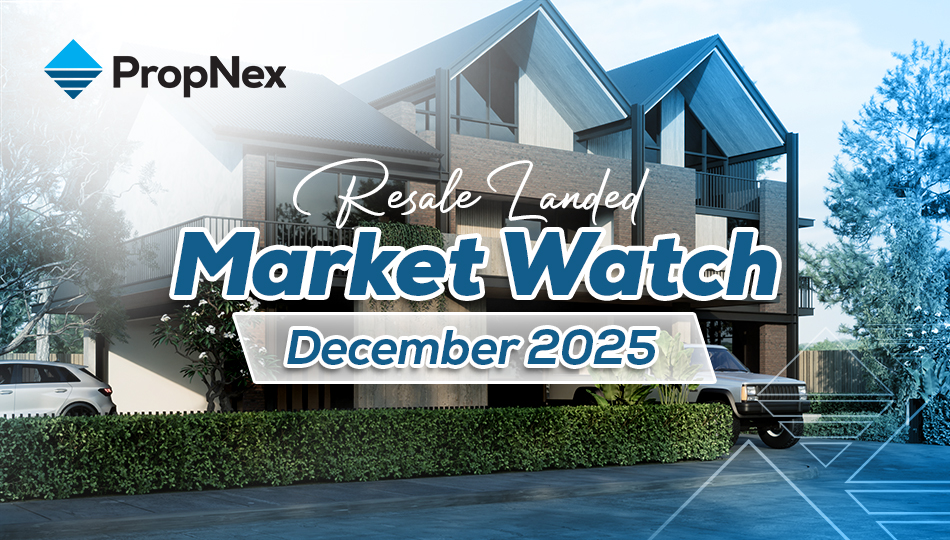2024 Will Be A Buyers Market : PropNex CEO
As the year draws to a close PropNex Picks caught up with CEO Ismail Gafoor to glean some insights into what buyers and seller could potentially expect in 2024, as well as the key opportunities and challenges that lay ahead.
1. The property market is ever-evolving and 2023 has been a year marked by uncertainties and cautious sentiment. What would be some opportunities that the market can look out for in 2024, and what do you think would be the main challenges?
Ismail: The market was fraught with uncertainties in 2023 – geopolitical tensions, slower global growth, weak external demand, high cost of living, inflation, and elevated interest rates. We think a lot of the uncertainties will likely persist into 2024, at least in the first half of the new year. That being said, market confidence remains intact so far and we think the property market should stay relatively resilient in 2024.
As we look into 2024, it is perhaps worthy to note that the private residential property market has had a decent run, with private home prices rising for six consecutive years between 2017 and 2022, and in all likelihood will chalk up a seventh straight year of growth in 2023 (see Table 1). As per the Urban Redevelopment Authority’s property price index, private home prices grew cumulatively by 3.9% in the first nine months of 2023. We are forecasting a 4% to 5% price growth for the full-year 2023. Are we expecting prices to correct in 2024? The short answer is no, and we will explain why shortly.
Table 1: URA Property Price Index
Year | YOY % Change in PPI | Year | YOY % Change in PPI |
2000 | -1.0% | 2012 | 2.8% |
2001 | -11.7% | 2013 | 1.1% |
2002 | -1.8% | 2014 | -4.0% |
2003 | -2.1% | 2015 | -3.7% |
2004 | 0.9% | 2016 | -3.1% |
2005 | 3.9% | 2017 | 1.1% |
2006 | 10.2% | 2018 | 7.9% |
2007 | 31.1% | 2019 | 2.7% |
2008 | -4.7% | 2020 | 2.2% |
2009 | 1.7% | 2021 | 10.6% |
2010 | 17.6% | 2022 | 8.6% |
2011 | 5.9% | 9M 2023 | 3.9% |
Source: PropNex Research, URA (the PPI methodology was revised in 2000 and 2015)
Coming back to challenges, a key one will continue to be the high interest rates. Although we have seen fixed home loan rates come off slightly in the later part of 2023 from the highs of more than 4% previously, the interest rates are still much higher than what many consumers are used to - seeing that we have enjoyed low rates for more than 10 years, since the global financial crisis.
We are also watchful of the geopolitical tensions around the world. The impact of geopolitical risks on the real estate market tends to be related to volatility owing to uncertainty about future economic growth as well as financial market volatility – which could then affect consumer confidence. For now, we think property buyers’ confidence is still intact and the Monetary Authority of Singapore is also projecting the country’s economic growth to improve in the second half of 2024. Meanwhile, our labour market remains tight and unemployment rate is low; these are all factors that will support the housing market.
In terms of opportunities, we believe it could be a buyers’ market in 2024 because home prices are peaking, some buyers are a bit tentative about entering the market, and developers who are well-aware of the challenges will be taking a more sensitive approach to pricing.
2. Following up on that, the government has rolled out three rounds of measures since December 2021. Clearly the measures have impacted sales. How do you see developers coping with these measures and what could be their strategy for 2024, in your view?
Ismail: Indeed, new private home sales have softened since the strong performance in July 2023 where more than 1,400 new homes (ex. executive condos) were sold. Part of the reasons for the slower sales is that there have not been that many launches towards the tail end of the year, and the market sentiment has also become more cautious. In addition, some buyers may also be waiting for new launches in 2024 so as to widen their options. Frankly, there are few choices now if they are looking at smaller units, like the 2-bedders. The smaller units tend to get sell-out quickly at project launches.
By and large, where developers are concerned, they have turned more prudent as well. With buyers being mostly price conscious and home prices having risen in the past years, we expect developers to be very sensitive with their pricing in 2024. Developers typically want sales to hit a certain threshold at the initial phase of the launch because they may have sales conditions tied to the disbursement of their loan from banks to fund the project development. Developers may also want to use sales proceeds to defray certain costs.
In addition, being able to move more than 30% of the units at the launch weekend will also help to get the sales momentum going – creating buzz in the market and in turn, drawing more buyers in. Another point to note is that developers have to sell all the units in the project in order to get the additional buyer’s stamp duty (ABSD) remission.
Therefore, we think prospective home buyers stand to benefit as initial prices would be realistic and sensitive to market sentiment when projects are launched. Developers may start to slowly move prices up once the take-up rate at projects crosses 50%, and/or when interest rates ease further and housing demand picks up. In 2024 as a whole, we are still expecting home prices to rise - private home prices could climb by 3% to 4%, while HDB resale prices may grow by 4% to 5%.
3. Given the abovementioned downside risks and uncertainties, what are your advice for home buyers in 2024?
Developers will be very careful with their pricing as they wish to garner a healthy take-up rate when the projects are launched, amid uncertainties in the market. Against this setting, we believe the conditions will favour buyers a bit more in 2024.
However, there are some buyers who may be hesitant to enter the market because they do not see others rushing in to buy, and overall sales volume is not rising much. Here, I am reminded of a Warren Buffet quote: “Be fearful when others are greedy, and be greedy when others are fearful”.
The key for buyers is to have a deep understand their own needs, their financial abilities; work with an experienced real estate salesperson to thoroughly study the pros and cons, and understand the property trends in the locations that they are keen on. If they find a property that fits the budget, fits their housing or investment needs, and if they know their stuff – because they have sound advice from their property agent – then they can go ahead and buy even when others are holding back. Similarly, they can also make an informed decision to sell when others are buying.
It is easy to be swayed by news headlines, and be paralyzed with fear. But if buyers start having that conversation with a property agent in advance, to discuss their housing needs, their financial commitment, what are their priorities and life goals, then they can plan ahead. Having done the due diligence earlier, buyers may be in a better position to take advantage of opportunities when they arise, rather than only start to think about it when a good deal comes along. By the time they are done, the property they desire may be gone.
For HDB flat owners, a consideration would be whether 2024 will present a chance for them to upgrade to a private home or an EC, since the market conditions seem to favour buyers.
HDB resale prices have recovered strongly, rising by nearly 36% as at Q3 2023 from Q1 2020. But let’s not forget that resale flat prices fell for six straight years between 2013 to 2018, following various cooling measures as well as the impact from HDB’s ramp-up of BTO supply by more than 100,000 flats from 2011 to 2014.
If all that sounds familiar, that’s because the government has made these moves again – three rounds of cooling measures since December 2021 and steadily boosting housing supply – to tame home prices and soothe demand in recent years. Through these measures, the HDB resale prices have started to moderate. We expect HDB resale prices to climb by 5% to 6% this year, far slower than the 10.4% increase in 2022 and 12.7% growth in 2021. With the HDB rolling out more BTO flats and with cooling measures still in place, we think HDB resale prices will likely grow at a slower pace, possibly keeping pace with inflation.
4. If it is a buyers’ market in 2024, what should sellers in the resale market do?
A question to ask is why one has decided to sell: is it to upgrade or right-sized to another home; is to recognise profits and the owner is cashing out; or perhaps the owner has run into some financial difficulties and need to sell the property.
If the intent is to upgrade or right-size, then 2024 may be an opportune time as we anticipate prices to stabilise and there is a slew of new projects that could be launched. Some prospective sellers may want to wait for the price of their resale home to rise, but they need to be mindful that this may not necessarily work in their favour. Assuming their $1-million home sees a 20% price jump, that works out to $200,000 extra. But the price of another property that they are eyeing could also similarly rise by 20%, which means that a $2.5-million property will cost $500,000 more at $3 million.
In cases where the owners just want to sell and take profit as it is an investment property, they need to consider if it makes sense over the mid- to long-term. These owners should be aware that they will have to pay ABSD in the future when they buy another investment property. Would it not be a better option to retain the property and draw recurring rental income by leasing out the unit? The rental yield may be attractive especially if the owners had purchased the units many years ago when prices were cheaper.
Finally, for those with dire needs and have to sell. My advice would be to be realistic about the asking price so that they can close the deal sooner, as opposed to holding out for a high price and not being able to find a buyer. It is not ideal if they find themselves in a situation where time is running out, and they are desperate to offload the property.
5. Why is it that private home prices are likely to stay resilient in 2024 despite the challenging conditions? What about the executive condo (EC) market?
We are anticipating home prices to rise at a slower pace in 2024 - private home prices could climb by 3% to 4%, while HDB resale prices may grow by 4% to 5%. There are a few considerations for this. First, land cost is firm and already locked in and secondly, developers have little room to cut prices due to the high construction cost, financing cost and labour cost. In 2024, the goods and services tax (GST) will be raised to 9%, this could also impact developers’ costs in terms of procuring goods and services. For the HDB resale market, it is hard to see prices come down because HDB flat owners have to factor in the cost of replacement home when they sell their flat.
In the EC segment, we expect demand for such homes to remain healthy among first-timer buyers and HDB upgraders as EC prices are still substantially lower than that of new private condos in the mass market. In Q3 2023, the median unit price gap between new ECs ($1,464 psf) and non-landed new private homes in the OCR ($2,080 psf) was 42%. Prices of new ECs have been inching up, with Altura achieving an average price of $1,474 psf from 316 units sold. We expect the prices of new ECs to stay firm, with a potential to increase further given that the land prices of EC sites have been elevated. Sim Lian Group recently secured the tender for a Tampines St. 62 (Parcel B) EC plot for $721 psf per plot ratio – a new record high for EC government land sales site.












